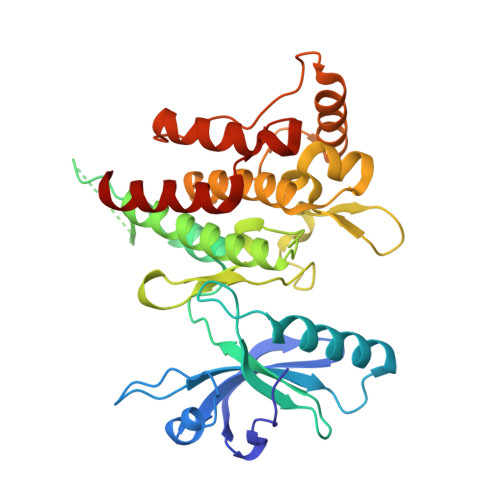Development of a Selective Dual Discoidin Domain Receptor (DDR)/p38 Kinase Chemical Probe.
Rohm, S., Berger, B.T., Schroder, M., Chatterjee, D., Mathea, S., Joerger, A.C., Pinkas, D.M., Bufton, J.C., Tjaden, A., Kovooru, L., Kudolo, M., Pohl, C., Bullock, A.N., Muller, S., Laufer, S., Knapp, S.(2021) J Med Chem 64: 13451-13474
- PubMed: 34506142
- DOI: https://doi.org/10.1021/acs.jmedchem.1c00868
- Primary Citation of Related Structures:
7BCM, 7BDO, 7BDQ, 7BE4, 7BE5, 7BE6 - PubMed Abstract:
Discoidin domain receptors 1 and 2 (DDR1/2) play a central role in fibrotic disorders, such as renal and pulmonary fibrosis, atherosclerosis, and various forms of cancer. Potent and selective inhibitors, so-called chemical probe compounds, have been developed to study DDR1/2 kinase signaling. However, these inhibitors showed undesired activity on other kinases such as the tyrosine protein kinase receptor TIE or tropomyosin receptor kinases, which are related to angiogenesis and neuronal toxicity. In this study, we optimized our recently published p38 mitogen-activated protein kinase inhibitor 7 toward a potent and cell-active dual DDR/p38 chemical probe and developed a structurally related negative control. The structure-guided design approach used provided insights into the P-loop folding process of p38 and how targeting of non-conserved amino acids modulates inhibitor selectivity. The developed and comprehensively characterized DDR/p38 probe, 30 (SR-302), is a valuable tool for studying the role of DDR kinase in normal physiology and in disease development.
Organizational Affiliation:
Institute of Pharmaceutical Chemistry, Johann Wolfgang Goethe University, Max-von-Laue-Str. 9, 60438 Frankfurt am Main, Germany.


















